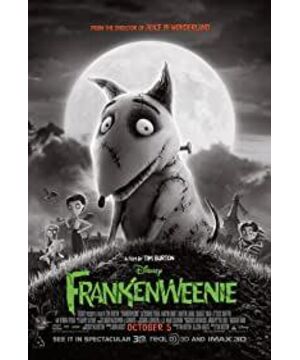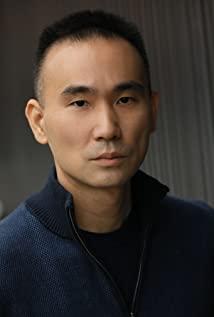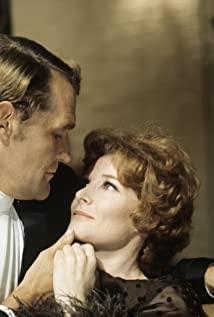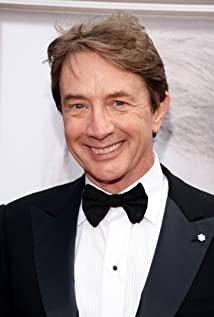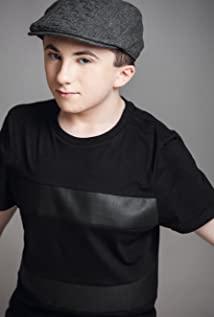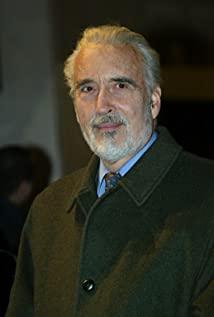This is another typical Tim Burton movie, from the soundtrack, to the style of art, to the meaningful dialogue of the characters, it all shows that it's his movie.
The film begins by revealing the gist of the film with a seemingly inconspicuous dialogue. Behind the discussion between new science teachers and students about "why lightning strikes people" reflects science (the teacher's point of view - lightning follows the path of least resistance to form a path between the sky and the ground) and fantasy (ie the student's point of view) -- the town's animal cemetery and other factors attract lightning, resulting in an unusually high probability of lightning hitting people in this town).
And that's what Tim Burton's films are all about.
A small town that believes in superstitious ideas and several people who believe in scientific (reality) concepts constitute the background environment in which the film takes place. Just like a police detective sent by a small town and city that believes in witchcraft ("Sleepy Hollow"), an English aristocrat who follows the etiquette and Alice who doesn't want to fall in love with someone she doesn't like ("Alice in Wonderland") "), a dad who loves to tell fantasy stories, and a son who doesn't believe them and thinks they're all made up ("Big Fish"), fantasy happens in this context.
And Tim Burton, in his usual way, subverts this environment by letting the film's plot play out in this indestructible scientific environment, practicing his fantasy concept.
The difference between this movie and other movies is that other Tim Burton movies are based on fantasy, but this movie is based on science. Other films try to challenge long-held beliefs to convey belief, the power of wishing. Like the memorable lines from "Alice in Wonderland" - Alice said: "It can't be" and the Mad Hatter said: "Unless you believe it". And Frankenstein is trying to make people understand how we should treat science. Before the new science teacher leaves, Frankenstein (the protagonist kid) asks him a question in front of his car: "Why did I succeed in my first experiment (he resurrected his puppy with lightning), And what about the failure in the second experiment? (At the request of his friend, he used lightning to help him resurrect a goldfish, but the goldfish disappeared in the end)" The teacher replied: "The purpose of a person's experiment is to affect the results of the experiment. The results of doing science with the concept of love are completely different from that of doing science with the concept of hate." This sentence seems to be the fantasy of Tim Burton, but how can we say that it is not a reflection of "the value of science itself" where?" the answer
Science itself is out of fantasy. People use logical calculations and experiments to explain the world, and Tim Burton tells us from the perspective of a fantasy world what we are studying when we study science.
That's the gist of this movie. Combining the work "Frankenstein" that the film is rooted in, and the gist of it, it can be seen that this is what the director wants to say.
From a cinematic point of view. First of all, the animation form used in this film gives the film a lot of room to play, allowing the director's ideas to be fully displayed, such as the images of different cats and dogs, and the plot of the movie at the beginning (these are the plots I like very much. ).
This film uses the shell of Frankenstein to creatively interpret the story of resurrecting life with lightning, which is what Tim Burton is very good at - "re-creating" a story, just like "Alice in Wonderland" The background setting and the adaptation of "Big Fish" to the original work, although he is not the screenwriter for all these movies, but I believe that these adaptations definitely have his participation. For this film, he successfully adapted this grim novel into a cartoon, structuring the monotonous plot into a carefully crafted town called "Dutch City", not done by scientists and adults but by A story written by a child with a strong sense of family and a new meaning to the story. From this point of view, this adaptation is undoubtedly very successful.
Tim Burton is one of my favorite film directors. An important reason is that the theme of his film is fantasy, but although he did not point it out, he conveyed a lot of his ideas about life in the fantasy plot, and these ideas are very similar to what I think, so I completely understand him. the meaning of. And fantasy itself is also my favorite, so I think his movies are great.
In the end, this is Frankenstein, a science story built on fantasy.
View more about Frankenweenie reviews


